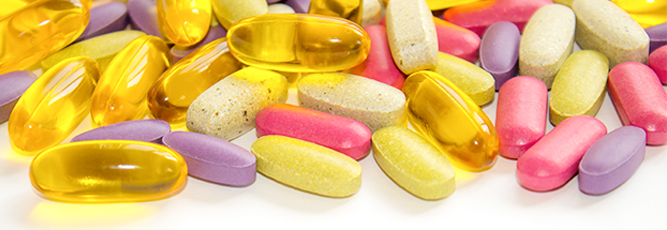Which medicines (दवाइयाँ) are safe to use during Pregnancy?
Normal pregnancy lasts for 38 to 42 weeks. However, there may be times during these weeks that you may have some physical issues such as vomiting, backache, and loose stools etc which require treatment with medicines.
Therefore, monitoring (निगरानी) and managing (प्रबंध) these physical conditions (शारीरिक हालत) becomes necessary to ensure a normal delivery.Management consists of both medicines and rehabilitation (पुनर्वास). Medicines are considered to be the first line of treatment; however, the health care provider needs to take care while prescribing medicines during pregnancy taking into consideration the harmful effects they can have on both – the mother and the foetus (भ्रूण). Medicines pass on via the placenta (गर्भनाल) from the mother to the foetus. Hence, before prescribing any medicine the provider should check the possibilities of the medicine causing any congenital defect (जन्मजात दोष). You should avoid medicines from the time of conception till the first 10 weeks, as this is the time when the foetus is most prone to the get permanent congenital deformities (जन्मजात दोष). Medicines (दवाइयाँ) given in the later stages (after 10 weeks) may cause systemic damage. For example NSAIDs (Non Steroidal Anti-Inflammatory Drugs) may lead to problems during labour or organ defects in the foetus.
Therefore, medicines should always be avoided during pregnancy. Still there are certain medicines, which can be taken but after consulting your physician. Let’s discuss the medicines that are safe during pregnancy.
The following is a list of medicines and their effects during pregnancy:
1. Analgesic Medicines
| Medicine | Effect |
| Paracetamol | Safe |
| NSAIDs, such as aspirin | May cause heart abnormalities in the third trimester |
| Salicylate | Should only be given in less doses and only when required. |
2. Opiates (दर्ददूरकर नींदलानेवालीदवा)
Opiates are only safe when used in low doses for limited period.
| Medicine | Effect |
| Codeine | Effective in low doses |
| Hydrocodone | Effective in low doses |
| Hydromorphone | Effective in low doses |
| Mepridine | Effective in low doses |
| Morphine | Effective in low doses |
| Oxycodone | Effective in low doses |
| Fentanyl | Effective in low doses |
3. Anaesthetics (बेहोशीकीदवा), Nerve-blockers and sedatives
| Medicine | Effect |
| Etomidate | Unknown always ask your provider |
| Ketamine | Avoid during the last trimester |
| Lorazepam | Avoid for severe conditions, safe for short periods |
| Midazolam | Avoid for severe conditions, safe for short periods |
| Propofol | Large doses may cause neonatal depression |
4. Thrombolytics
The overall safety of these medicines is not known. The possible advantages of this class may balance the risk during pregnancy. Common medicines used are: Alteplase, Reteplase, Streptokinase, Urokinase.
5. Antidotes (विषहरऔषधी)
The possible advantages of this class may balance the risk during pregnancy.
| Medicine | Effect |
| Hydroxycobalamin antidote: cyanide | Safe |
| Methylene blue antidote: methemoglobinemia | Has a potential risk to the mother and foetus |
| Naloxone antidote: narcotics | Foetal withdrawal |
| Pyridoxine antidote: isoniazid overdose | Safe |
6. Antimicrobials: They may affect the neonates (नवजात शिशु).
| Medicine | Effect |
| Aminoglycosides | Not safe and not prescribed |
7. Cephalosporins
| Medicine | Effect |
| First generation: cephalexin, cefazolin, cefadroxil | Safe |
| Second generation: cefuroxime, cefaclor, cefoxitin, cefprozil | Safe |
| Third generation: cefdinir, cefotaxime, ceftazidime, ceftriaxone, cefpodoxime, ceftizoxime | Safe |
| Clindamycin | Safe |
| Chloramphenicol | Grey baby syndrome |
| Azithromycin | Safe |
| Metronidazole | Should not be given in first trimester; Safe in second and third trimester |
8. Penicillins
| Medicine | Effect |
| First generation: penicillin G, benzathine penicillin, Bicillin, penicillin VK | Safe |
| Second generation: oxacillin, dicloxacillin, nafcillin | Safe |
| Third generation: ampicillin, ampicillin-sulbactam, amoxicillin, amoxicillin-clavulanate | Safe |
| Fourth generation: ticarcillin, ticarcillin-clavulanate, piperacillin, piperacillin-tazobactam, carbenicillin | Safe |
| Medicine | Effect |
| Carbamazepine | Teratogenic agent |
| Phenobarbital | Not advised |
| Phenytoin | Teratogenic agent |
| Valproic acid | Teratogenic agent |
10. Cardiac agents
| Medicine | Effect |
| Adenosine | Safe |
| Digoxin | Not advised in third trimester |
| Lidocaine | Safe |
| Procainamide | May cause lupus |
| Sotalol | Probably safe |
11. Beta- blockers
| Medicine | Effect |
| Atenolol | Advised with care |
| Metoprolol | Advised with care |
| Propranolol | Advised with care |
12. Calcium channel blockers
| Medicine | Effect |
| Diltiazem | To be used safely |
| Nifedipine | sublingual form is not advised |
| Verapamil
|
Safe |
13. Diuretics
| Medicine | Effect |
| Hydrochlorothiazide | Not given if gestational hypertension |
14. Diabetes: Insulin is safe to use during diabetes
15. Antacids
| Medicine | Effect |
| Famotidine | Low risk |
| Ranitidine | Safe |
| Dolasetron | Low risk |
| Granisetron | Low risk |
16. Corticosteroids: Advised for short term use
| Medicine | Effect |
| Prednisolone | Short term |
| Diphenhydramine | Safe |
| Cetirizine | Almost safe |
| Chlorpheniramine | Safe |
Always talk to your physician in case of any complication and before taking any medicine given above.

